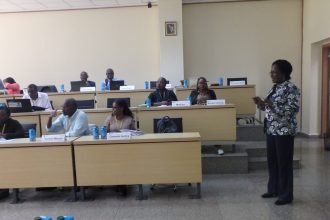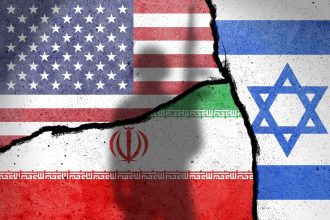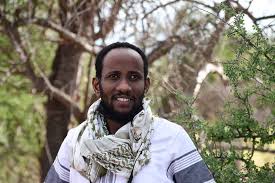A Kenyan scientist has been recognised for his efforts to save the world’s most endangered antelope at this year’s Animal Action Awards.
Dr Abdullahi Ali, Founder of the Hirola Conservation Program (HCP), has been awarded the Lifetime Achievement Award by the International Fund for Animal Welfare (IFAW) at the BAFTA in London. He has dedicated his life solely to the conservation of the hirola antelope, whose population is approximately 500 individuals, making it one of the most critically endangered mammals on earth.
Growing up in Garissa, a remote town in Kenya’s northeastern region and historical range for the hirola, Dr. Ali overcame great odds to acquire an education and become a distinguished scholar. He earned his bachelor’s degree in wildlife biology in 2005, a master’s degree in Conservation Biology from the University of Nairobi in 2010 and received his Ph.D. in Ecology from the University of Wyoming, where he also won the Outstanding Dissertation of the Year award in 2016.
In 2005, the Kenya Wildlife Service (KWS) reached out to Dr. Ali to spearhead the Hirola Management Committee in northeastern Kenya. As it is mainly found in community lands, he works to support community-based conservation programs focused on hirola conservation.
He founded the Hirola Conservation Program (HCP) in 2014 and has performed groundbreaking work to save the critically endangered antelope. His leadership, which combines evidence-based conservation, climate mitigation, habitat restoration, and community action, has made him a global voice for community-led conservation. “Individual animals surviving and thriving keep us motivated despite the challenges we encounter. Small things that we do matter. In 2012, we placed GPS tags on 12 hirolas in a very insecure and volatile area. This exercise contributed foundational research on hirola ecology, including species habitat requirements and diet. It also helped us to understand that range degradation is the primary contributor to the decline of the species,” says Dr. Ali.
“Unfortunately, the poaching of over five thousand elephants in the 1980s also degraded the hirola rangeland. Replanting grasses that the antelope feed on has been pivotal in keeping the species alive,” says Dr. Ali. “Climate change is a major challenge in northeastern Kenya – it’s either drought or floods. There are a lot of humanitarian efforts, but unfortunately, there is very limited support for wildlife. That is where we come in, to rescue and feed impacted animals or those seeking refuge in people’s homes during floods – including crocodiles. We work with the Kenya Wildlife Service to get the wildlife and release them back into their habitat,” he adds.
Acquiring resources to care for the hirola is not easy, as donors tend to fund well-known charismatic species like elephants and lions. Another challenge in hirola conservation is that when grasses are re-established to restore the rangeland, primarily found in community lands, existing traditional grazing plans are altered and, in some instances, the local communities tend to increase their livestock numbers. This is a problem because hirola and cattle eat the same food.
Despite these challenges, Dr. Ali has made significant strides in animal welfare and conservation in northeastern Kenya. His work sets him apart owing to his dedication, innovation, and deep commitment to preserving wildlife.
“I congratulate Dr. Ali on winning the lifetime achievement award! His academic pursuits and commitment to animal welfare and rescue, especially in Kenya’s remote northern region, make him a suitable winner,” said James Isiche, Africa Director, IFAW. “What Dr Ali has accomplished takes resilience and discipline. This win should create much-needed global awareness of the little-known and highly endangered hirola antelope and help mobilise much-needed resources to do more not just for the antelope but for wildlife species in North Kenya in general,” he added.
In 2017, he established the Somali Giraffe Project (SGP), a community-based conservation project that focuses on the conservation and recovery of the endangered reticulated giraffe, particularly those afflicted by human-wildlife conflict and civil war in Somalia. The Geri Tracker initiative under SGP provides the first-ever GPS satellite giraffe tracking technology for understanding giraffe movements, spatial needs, and habitat use throughout Northeastern Kenya, and aims to improve conservation efforts. The Kenyan Wildlife Service has also appointed Dr. Ali as the honorary warden for the Eastern Conservation Area, where he leads wildlife rescue, rehabilitation, and re-wilding efforts in the vast Northeastern Kenya.
Following a prolonged drought in Kenya and many parts of the Horn of Africa, which persisted from late 2020 through to 2022, Dr. Ali, through his organisation Hirola Conservation Program (HCP), initiated emergency intervention measures in 2021 and throughout 2022 to avert loss of life and livelihoods.
Some of the interventions include water tracking and supplemental wildlife feeding for key species, including warthogs, giraffes, and Zebras.
He is tackling climate change in an area that gets little assistance from agencies, tourism, or other sources. He is bringing environmental awareness, education, and rehabilitation to his home to save the hirola. He has put 10,000 acres of wildlife habitat under environmental restoration. He and HCP undertake village-based education and outreach programs for communities, integrating field visits with outreach programs entailing lectures, video shows, public discussions, and de-snaring patrols. HCP, currently works with 40 local rangers, decreasing poaching and environmentally destructive practices.
Internationally, Ali serves as the President of the Kenya Chapter of the Society for Conservation Biology, is a longstanding member of the International Union for Conservation of Nature Species Survival Commission (IUCN/SSC) Antelope Specialist, a recent member of the IUCN’s Giraffe and Okapi Specialist Group, a National Geographic Explorer, and works as a fellow for the Zoological Society of London’s EDGE (Evolutionarily Distinct and Globally Endangered) group.
Ali is also a member of the National Hirola Management Committee (Kenya), an elected National Giraffe Conservation Task Force (Kenya) member.
He has received various awards globally for his conservation work including the prestigious Whitley Funds for Nature Awards, the National Geographic/Buffett Awards for Leadership in Conservation in Africa, EDGE Affiliate Conservation Heroes Award from the Zoological Society of London, Hornaday Conservation Award for excellence in mammal conservation by the American Society of mammalogists, Disney Conservation Hero Award, the Garissa County outstanding service Award and the Humane Hero Award by the American Humane Society.
IFAW’s Animal Action Lifetime Achievement Award recognises those who have dedicated their lives to rescue or conservation and have made a meaningful difference in their field.




